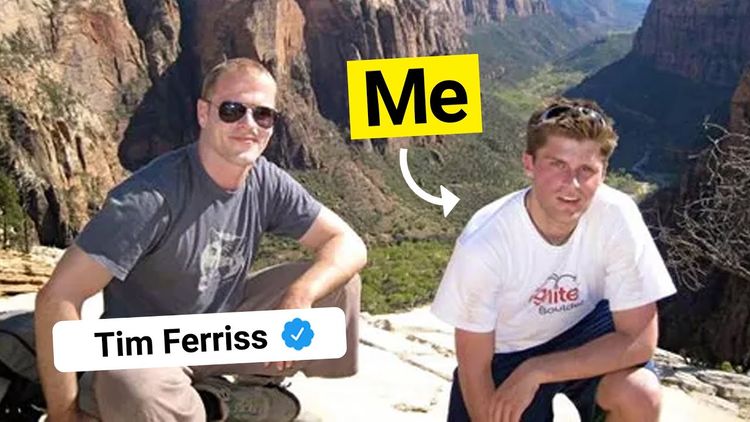“Who should I work for?”

I get this question a lot from people who have read Recession Proof Graduate. Most of them have no clue what type of person they want to work with, so they usually do one of two things:
- Send offers to work for free for every company in their industry (HORRIBLE idea)
- Approach authors with free work
#1 is idiotic. You should not approach anyone unless you’re intimately familiar with their business, and are a genuine fan of their work/products. Doing free work isn’t about doling yourself out for slavery; it’s about selectively working with pros who can grant you hands-on learning and invaluable experience, in a field that’s meaningful to you.
#2 is also ill-advised. Even though approaching authors worked out for me and Ryan and Ben, I generally don’t advocate targeting the author niche. Writers are interesting people, but they typically don’t make much money. Most of them won’t be able to pay you once the free work comes to an end. Unless it’s an amazing once-in-a-lifetime opportunity, there are better uses of your time.
What I suggest in the e-book is approaching successful entrepreneurs. No matter what you’re interested in — photography, architecture, cooking, fashion, etc. — the people in your field who are earning the most are all successful entrepreneurs. They were all able to turn their skills into viable businesses, and have found ways to make their passion profitable.
It’s fine to work with a brilliant inventor or a gifted artist, but if they know nothing about sales or marketing or running a business, they are going to have a really tough time sustaining their hobby. And you will run the risk of never making money with them. You need to get your foot in the door with people who know what the hell they’re doing. And if they’ve already achieved some degree of success, they’re more likely to be successful again in the near future. Not a bad idea to hitch yourself onto a rising star.
Every person I’ve done free work for has been a self-made entrepreneur, because that’s what I wanted to become. I was a genuine fan of their work, knew all about their past projects, and had done enough research to figure out what problems they were currently facing, and how I might be able to help. The fact that a bunch of these people were best-selling authors was somewhat incidental.
Another reason I suggest working with entrepreneurs is because they are interested in changing the world at a fast pace. Their enthusiasm is contagious, and their work ethic is much stronger than your average employee at a big company. You will not regret the decision to expose yourself to their work process — you’ll absorb some of their DNA and make it your own. Even if you don’t want to become an entrepreneur yourself, you will still gain a lot from the experience.
# # #
So… where do you find successful entrepreneurs? Think about the products / services you use regularly and love, or the companies that you buy from repeatedly throughout the year. Those businesses were created by entrepreneurs. You can do research on them and figure out which ones might be easy to approach and receptive to free work.Of course, that task might seem too broad or difficult. And if you live in the mid-West, the only companies you can think of are Wal-Mart and Best Buy, so you’re out of luck there.If you can’t think of any entrepreneurs, take a look at Kickstarter projects* that are ending soon.
[*In case you’ve been living under a rock: Kickstarter is a crowd-funding platform that allows people to raise money for creative projects. The site is three years old, and in 2012, they helped artists and entrepreneurs raise over $319 Million for their projects, from more than 2 million donors in 177 countries. KS is pretty awesome, and it’s very effective.]
Kickstarter projects that have received over $100K in funding — or get 200%+ funding — clearly have some level of demand. The people who are running these projects are likely freaking out about having to fill all those orders, and are wondering how they’re going to pull this off. Many of them are under more pressure than they’ve ever dealt with. The sweet smell of opportunity is in the air…
If you find a project that you love, and the people running it seem like genuinely good folks who know what they’re doing (do your research- Google them!), then reach out and offer to help. First, tell them why you love what they’re doing (and don’t B.S. this part, it’s a waste of everyone’s time), and the potential you see — what you think it could become and how it could change the world in some way.
Then make them an offer: say you don’t normally discount your rates, but that you truly love what they’re doing, and think you could add some value. Say that you’d be willing to do ______ (sales, marketing, customer service, web design — whatever valuable skill you have) for two weeks at no charge. Lay out exactly why you’d love to do it, what you plan to do (give them a sample of your work), and how it will specifically benefit them. Then say if they like your work and you enjoy working together, then you can all discuss a more formal arrangement at the end of the two weeks. If they don’t like your work, they can scrap it, dismiss you on the spot, and there will be no hard feelings on your end.
You might balk at this and wonder, “Why on earth should I offer free work to an amateur entrepreneur / artist?”
For one, a lot of them are doing really cool stuff. I hear people complain all the time about not wanting to work for a soul-sucking boring company. Well, Kickstarter is a huge community of creative people working on things they’re passionate about. Some of them raise a TON of money, but are too inexperienced to pull it off, even though they might have a viable business on their hands.
If only they could find a talented partner to work with…
Why not figure out what their biggest problems and stumbling blocks are going to be, then reach out with an offer to help. If you can actually DELIVER what you’re promising, then they will have more to lose by not paying you than you’ll have to lose. They will want to keep you around.
I’m not making this strategy up. I’ve had a handful of friends reach out to total strangers on Kickstarter, and successfully find themselves working on stuff they loved. My buddy was sick of his 9-5 job at Wells Fargo, so he reached out to a filmmaker on Kickstarter. He ended up traveling around South America for a month, shooting footage, and ended up as a subject in the documentary. He said it was the best decision he’d ever made.
# # #If you really want to work on something unique and meaningful, Kickstarter is a great place to find those opportunities. The web makes it so unbelievably easy to connect with like-minded people — it still astonishes me that so few of us actually take advantage of it! If I was able to connect and work with best-selling authors and successful entrepreneurs all around the country — from Colorado — then anyone can do it, from anywhere.
The goal is to work with people who can step up your game, help you develop skills that you want to master, present you with experiences you crave, and connect you with more folks who are just like them.
If you’re a young person who’s not sure what to do with their life, get off of Facebook/Reddit, and make a move towards doing something. It doesn’t have to be perfect, it doesn’t have to be a long-term play — it just has to be a step in the direction you want to go. Because once you’ve taken that first step, you’ll be able to see the second step. And then the third step. And eventually, you’ll have momentum, and you’ll have made huge progress. But you can’t climb a mountain until you take that first step…
And if you have to offer free work to take that first step, don’t hesitate — DO IT!






Member discussion